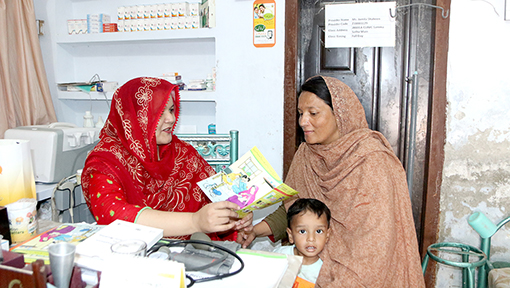Beyond the waiver
By Muhammad MubashirPublished On 07 Oct 2025

Just weeks before World Contraception Day in September, the government of Pakistan announced a step forward: the waiver of all taxes on contraceptives.
This long-sought policy change is more than a fiscal adjustment, reflecting years of advocacy by many partners that contraception is not a luxury, but a necessity. By lifting a hidden cost barrier, the government has opened a door of hope for millions of families striving to plan their futures with dignity.
Still, the decision is only a beginning. Waiving taxes on contraceptives is a modest step compared to the reforms Pakistan urgently needs. Pakistan's family planning system still faces significant challenges that limit its ability to meet people’s needs.
Service delivery is fragmented across federal and provincial levels. Stockouts of contraceptives are frequent, especially in rural areas, and counselling often focuses narrowly on method provision without empowering clients with complete information to make informed choices.
According to PDHS 2017-2018, more than 17% of married women of reproductive age — an estimated six to seven million women — want to avoid pregnancy but cannot access or afford a modern method. The Guttmacher Institute's study indicated that over four million pregnancies every year — almost half of all pregnancies — were unwanted.
Behind these figures are human stories. Take Ayesha, a young mother in rural Sindh. She hoped to delay her next pregnancy until her first child started school.
But the nearest government clinic often ran out of contraceptives, while the private pharmacy charged more than her family could pay. Without real choice, she faced an unintended pregnancy that strained her health and household resources. For women like Ayesha, the fragmented services mean that even when the desire and intention are clear, the system is not always ready to support them.
At the structural level, Pakistan must also reconsider how resources are allocated. The current National Finance Commission (NFC) Award ties provincial transfers to population size, inadvertently rewarding rapid growth and discouraging family planning.
Decoupling these allocations and linking them instead to human development outcomes such as education, health and gender equality, would create stronger incentives for progress.
Equally important is ensuring financial sustainability. While the waiver lowers costs for families, it does not fund procurement, service delivery or outreach to remote communities. Pakistan's family planning programmes have long relied heavily on donors, leaving reforms vulnerable to shifting priorities. Sustainable progress will require greater domestic financing, whether through co-funding between federal and provincial governments, earmarking health insurance revenues, or private-sector partnerships with affordable pricing models.
One promising approach is to integrate family planning into public health insurance. Pakistan’s Sehat Sahulat Programme has given millions access to hospital care.
Extending its benefits to include contraceptive services and counselling would not only reduce out-of-pocket costs but also affirm that family planning is an essential part of health care — saving lives, preventing unintended pregnancies and reducing long-term maternal and child health costs.
International examples show the power of such investments. Bangladesh expanded community-based distribution and counselling, lifting contraceptive use from under 10% in the 1970s to over 60% today. Indonesia integrated family planning into its primary health system through village-level health posts and community mobilisation, ensuring access even on remote islands.
These investments not only fuelled declines in fertility but also led to improvements in women’s education, workforce participation and economic growth.
Pakistan can learn from these successes while tailoring solutions to its federal structure. Unlike Bangladesh’s centralised approach, Pakistan must prioritise coordination between federal and provincial authorities, with clear roles, accountability and joint financing.
Lessons from Indonesia’s community engagement could also be adapted, mobilising lady health workers, faith leaders and local influencers to normalise contraceptive use and counter misinformation.
With World Contraception Day 2025 having recently passed, under the banner of "A choice for all — agency, intention, access", Pakistan has an opportunity to show leadership.
The tax waiver is a welcome breakthrough, but it must be followed by systemic reforms: sustainable financing, reliable services, stronger supply chains and women-centred approaches that protect dignity and expand real choice.
If Pakistan delivers on this promise, the waiver will not be remembered as a token gesture. It will mark the beginning of a new chapter — one where women like Ayesha, and millions of others, finally have the freedom to decide, the power to plan and the opportunity to thrive.









